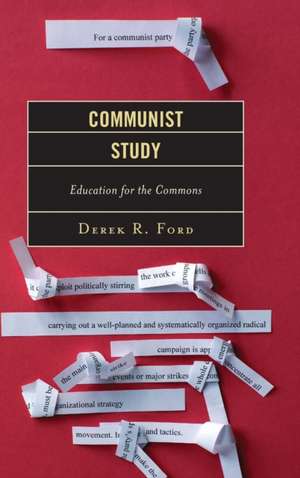Communist Study: Youth Culture and Pedagogy in the Twenty-First Century
Autor Derek R. Forden Limba Engleză Hardback – 16 sep 2016
Contending that radical politics needs educational theory, Communist Study: Education for the Commons poses a series of educational questions pertinent to revolutionary movements: How can pedagogy bridge the gap between what is and what can be, while respecting the gap and its uncertainty and figurality? How can pedagogy accommodate ambiguity while remaining faithful to the communist project? In answering these questions, educational theorist Derek R. Ford develops a pedagogical constellation that radically opens up what education is and what it can mean for revolutionary struggle. To chart this constellation, Ford takes the reader on a journey that traverses disciplinary and ideological boundaries, innovatively reading theorists as diverse as Agamben, Marx, Lyotard, Butler, and Lenin. Demonstrating that learning is the educational logic that underpins capitalism and democracy, Ford articulates a theory of communist study as an alternative and oppositional logic. Poetic, performative, and provocative, this theory of study is oriented toward what Ford calls the sublime feeling of being-in-common, which, as he insists, is always a commonness against."
Preț: 602.60 lei
Preț vechi: 782.59 lei
-23% Nou
115.31€ • 123.30$ • 96.14£
Carte tipărită la comandă
Livrare economică 18 aprilie-02 mai
Specificații
ISBN-10: 1498532446
Pagini: 170
Dimensiuni: 158 x 238 x 17 mm
Greutate: 0.41 kg
Editura: Rowman & Littlefield
Seria Youth Culture and Pedagogy in the Twenty-First Century

